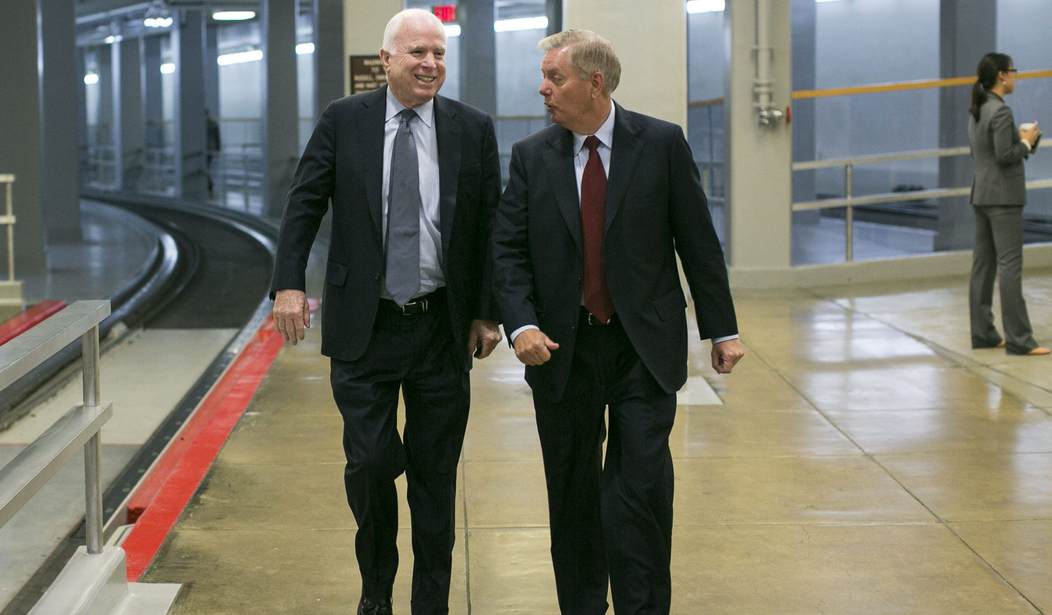WASHINGTON — Sen. Lindsey Graham (R-S.C.) stressed today that his long-lasting friendship with Sen. John McCain (R-Ariz.) won’t fall victim to McCain’s refusal to vote for Graham’s Obamacare repeal-and-replace bill.
McCain, whose “no” vote killed Senate Republicans’ July “skinny repeal” legislation, resurrected his argument that the Senate needs to return to regular order as he announced his decision via a statement today ahead of next week’s expected vote on the Graham-Cassidy bill.
“Committees of jurisdiction should mark up legislation with input from all committee members, and send their bill to the floor for debate and amendment. That is the only way we might achieve bipartisan consensus on lasting reform, without which a policy that affects one-fifth of our economy and every single American family will be subject to reversal with every change of administration and congressional majority,” McCain said.
“I would consider supporting legislation similar to that offered by my friends Senators Graham and Cassidy were it the product of extensive hearings, debate and amendment,” he added. “But that has not been the case. Instead, the specter of September 30th budget reconciliation deadline has hung over this entire process.”
Senate Republicans have been pushing Obamacare repeal through the budget reconciliation process so they can pass it on a simple majority.
“We should not be content to pass health care legislation on a party-line basis, as Democrats did when they rammed Obamacare through Congress in 2009,” McCain continued. “If we do so, our success could be as short-lived as theirs when the political winds shift, as they regularly do. The issue is too important, and too many lives are at risk, for us to leave the American people guessing from one election to the next whether and how they will acquire health insurance. A bill of this impact requires a bipartisan approach.”
Senate Health, Education, Labor, and Pensions (HELP) Committee Chairman Lamar Alexander (R-Tenn.) and Ranking Member Patty Murray (D-Wash.) have been using the time since the “skinny repeal” failure to try to arrive at a bipartisan compromise to fix Obamacare. “But I fear that the prospect of one last attempt at a strictly Republican bill has left the impression that their efforts cannot succeed,” McCain said. “I hope they will resume their work should this last attempt at a partisan solution fail.”
Murray said she’s “still at the table ready to keep working, and I remain confident that we can reach a bipartisan agreement as soon as this latest partisan approach by Republican leaders is finally set aside.”
McCain said he could not “in good conscience vote for the Graham-Cassidy proposal,” noting the lack of a Congressional Budget Office score and not “knowing how much it will cost, how it will affect insurance premiums, and how many people will be helped or hurt by it.”
“I take no pleasure in announcing my opposition. Far from it. The bill’s authors are my dear friends, and I think the world of them. I know they are acting consistently with their beliefs and sense of what is best for the country. So am I,” he said. “I hope that in the months ahead, we can join with colleagues on both sides of the aisle to arrive at a compromise solution that is acceptable to most of us, and serves the interests of Americans as best we can.”
Graham issued a statement emphasizing that while he thinks his bill “is the best chance to repeal and replace Obamacare,” his friendship with McCain “is not based on how he votes but respect for how he’s lived his life and the person he is.”
Graham added that he will “respectfully disagree” with his best friend’s decision.
“Obamacare is collapsing in Arizona, South Carolina, and across the nation – driving up premiums and reducing choices. I feel an obligation to fix this disaster and intend to push forward for state-centric health care versus Washington-knows-best health care,” he said. “I’m completely convinced taking money and power out of Washington and returning it to states to administer health care is the best way to replace a collapsing Obamacare system. I’m excited about solutions we have found in Graham-Cassidy-Heller-Johnson. We press on.”
On Tuesday, Alexander said he and Murray “had hoped to agree early this week on a limited, bipartisan plan to stabilize 2018 premiums in the individual health insurance market that we could take to Senate leaders by the end of the month.”
“During the last month, we have worked hard and in good faith, but have not found the necessary consensus among Republicans and Democrats to put a bill in the Senate leaders’ hands that could be enacted,” the chairman said.








Join the conversation as a VIP Member